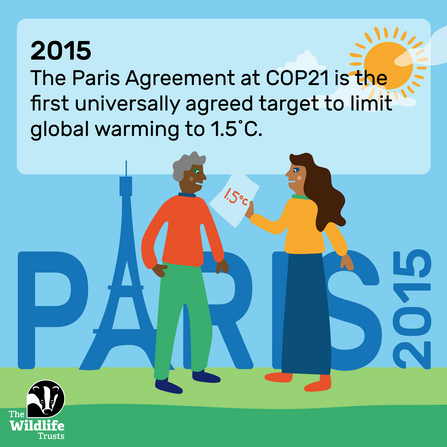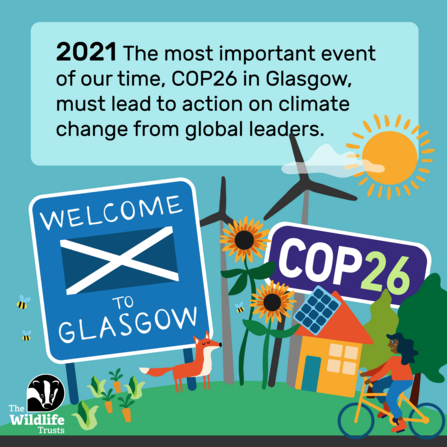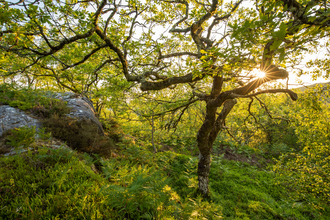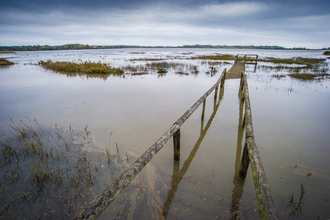What is COP27?
COP stands for 'Conference of the Parties' and these are UN conferences on its different conventions. In 2022, there are COPs taking place on both climate (COP27) and nature COP (COP15). COP27 is where world leaders come together to talk about climate change and how to tackle it, as it's the COP for the UN Framework Convention on Climate Change - and this meeting is their 27th!
COP27 is taking place between Sunday 6th November - Friday 18th November 2022, and is being hosted by Egypt in Sharm el-Sheik.
What do The Wildlife Trusts want to see from COP27?
We cannot restore nature without tackling climate change, and we cannot tackle climate change without restoring nature. The Wildlife Trusts want to see the bold rhetoric and ambitions translated into real action this decade to tackle the twin nature and climate crises together. Action to restore nature must therefore be central to negotiations at COP27.
A year on from COP26 in Glasgow, very little progress has been made. Climate breakdown is accelerating rapidly, observed impacts are worse than expected, and soon they will outpace our ability to limit and adapt to them. In 2022, records have been broken across the planet including temperatures exceeding 40°C for the first time in the UK, and flooding in Pakistan reportedly covered one-third of the country, the worst ever seen.
Time is running out to avoid catastrophic warming above 1.5oC
If the UK wants to be a world leader on climate and nature, it must make sure it is taking the same action at home as it is encouraging others to take internationally, and support other countries to cope with climate change impacts already being felt.
Progress must be made by all governments in the UK to protect 30% of land and sea for nature by 2030. The UK must also strengthen, not weaken, its environmental protections - ensuring that our most precious wildlife sites are safe for future generations.
Protecting nature and prioritising resilience is becoming even more critical in the wake of global extreme weather events in 2022.
A potted history
COPs are the ultimate decision-making meetings and this one will review progress made by the 197 nations and territories that have signed the UN's Convention on Climate Change.

Each COP is hosted by a different nation, and two of the noteworthy COPs took place in 2015 and 2021.
COP21, which was hosted by Paris in 2015, resulted in the Parties (the 197 nations and territories) signing a new legally binding global treaty. This treaty committed those nations to ambitious action to limit average temperature change to 1.5oC above pre-industrial levels.

COP26, held last year in Glasgow, was the first real test of the commitment to delivering this agreement. During this meeting the Parties debated how they would achieve limiting temperature change to the agreed level.
The resulting Glasgow Climate Pact kept the ambition alive - but only just. Commitments to 'phase down' coal and end inefficient fossil fuel subsidies, were more aspirational than previous commitments - and smaller groups of countries also agreed to reduce methane emissions, halt deforestation, tackle transport emissions and end financing of overseas fossil fuels.
But action was missing on how to manage loss and damage from climate change, and provision of climate finance for countries on the frontline of climate impacts.
Actions you can take
Want to carry on reading?
Find below a selection of our blogs and news items about COP27 and climate change.

Survey suggests pollution, land use change and flooding are a public concern for nature, but worry about sea level rise also surges for younger people
Climate change is threatening our natural world and adapting to its impacts is extremely important. Eleanor Johnston (Climate Change…

A review of The Climate Change Committee's Seventh Budget Advice from a land and nature lens
There is a lot to applaud in the Climate Change Committee’s seventh carbon budget advice to the UK Government, which is out today. But…

The climate driven storm of the century should ground Reeves’ push for airport expansion
As a wave of recent rhetoric from UK Government sends shockwaves across a nature-loving nation, it would seem that the new Labour…

